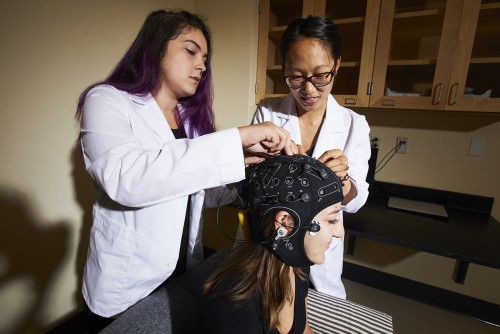English Major Offers Strong Foundation for Many Careers
In law, government, entertainment and countless other careers, English majors bring critical thinking and analytical skills that allow them to thrive.
At the Los Angeles office of her NBC publicity department internship, Love Boussiquot ’16 had an epiphany; she ran to the parking lot to call Helga Duncan, professor of English, for advice. “I had changed my major to communication, but realized that everything I loved about my internship had more to do with storytelling than PR outreach,” she explains. “I missed the reading and creativity of English and changed my major back on the spot.”
According to Laura Scales, professor and department chair, it is unsurprising that Professor Duncan took Boussiquot’s call, reassured her the change was possible and then worked with her to realign her course credits for English. “We have an extraordinarily dedicated faculty who choose to teach at a small college where they can build close ties with students,” she says. “These interactions are part of academic life here.”
Common Skills — Shakespeare or Case Law
Today, Boussiquot applies skills from her English-major origins to reviewing and refining scripts as manager of current series for Disney Television Animation. “All of those classes spent reading and finding underlying themes — it all applies to every part of my role here,” she says. “In the end, an 11-minute cartoon is not fundamentally so different from ‘Beowulf.’”
Those transferrable skills apply equally to the law, according to Patrick Kennedy ’16, a litigation associate with the internationally renowned law firm Constantine Cannon LLP. “The things that drew me to English also drew me to law,” he says.
Through Kennedy’s three years of law school and beyond, he notes feeling well prepared by his Stonehill English degree. “You’re reading case law and following where iterations of reasoning lead,” he says. “You’re already a good part of the way there if you’ve studied texts in English literature.”
Love Boussiquot ’16 uses skills and knowledge gained from her days as an English major to review and refine scripts as manager of current series for Disney Television Animation.
Moving From Theory to Practice
In the Stonehill tradition, the critical thinking, reasoning, persuasive writing and storytelling skills that English majors develop are applied through myriad on- and off-campus opportunities. On campus, a creative writing club, literary magazine and English Society — run by students with a faculty advisor — offer leadership experience while students pursue literary interests. At an annual literature conference held with UMass Boston and Bridgewater State University, students present complex interpretations of texts that may be unfamiliar to audiences, then defend those interpretations during rigorous discussion.
Similarly, the Stonehill Undergraduate Research Experience (SURE) offers an opportunity for students to develop publishable research under the mentorship of experienced faculty. One English program alumna, now an English teacher, recently studied religious culture in 19th-century America with Scales, developing a paper for presentation at an undergraduate academic conference. “It is a powerful experience for an undergraduate student to develop this level of independent, viable research outside the classroom,” Scales says.
“Students take ownership for their own work and develop readiness to jump into the world of professional work or graduate school,” notes Scales.
Some immersive learning is simply connected to Stonehill’s culturally rich surroundings; professors tie courses to theater outings, lectures and historical site visits in locales such as Boston, Providence and Concord. “We have an embarrassment of local riches that bring literature to life,” adds Scales.
We are teaching students to be adaptable and flexible thinkers. No matter how the economy changes, studying English makes you a resilient participant in the workforce.
Out of Classic Texts, Modern Careers
In addition to benefiting from their required internship, many students choose to double major or minor in an associated field, pairing the foundational learnings of literature with a career interests such as education or marketing.
Briana Reidy ’26 intended to take pre-med courses on her way to a neuroscience career, but a fiction course with Professor Scott Cohen reawakened her love of literature. After working with her professors and the College’s Career Development team to redefine her path forward, Reidy changed her major to English. She will complete a practicum requirement next spring and leave Stonehill as a licensed 5-12 teacher in Massachusetts. “Faculty here are not only passionate about the classes they teach; they’re driven to help you develop as a student,” she says.
Building on their Stonehill internships with wide-ranging organizations — U.S. attorneys’ offices, publishing houses, advertising agencies and beyond — alumni pursue an endless list of career possibilities with their English degree in hand.
Carolyn (Meklenburg) Norkiewicz ’14, a declared English major from Day 1, discovered a second passion — for service — that fueled her postgraduate career plans. “As I moved through Stonehill and took advantage of opportunities before me, what spoke to me was the ethic of service work and social justice that pervades life at the college,” she notes.
Upon graduating, Norkiewicz pursued a burgeoning interest in the environment with an AmeriCorps Cape Cod service year. With a position at the Lowell Parks and Conservation Trust, she honed her interests in environmental planning and policy, obtained a graduate degree at Tufts University and now spearheads climate resilience programs throughout Massachusetts as municipal vulnerability preparedness regional coordinator in the Massachusetts Executive Office of Energy and Environmental Affairs. “What I learned at Stonehill directly applies to my work in reviewing climate adaption grant projects,” Norkiewicz says. “I’m not a climate scientist, but I can look at information, consider perspectives and think critically in partnership with the municipalities we serve.”
Climate advocacy is just one field that continues to make the English major as relevant as ever in the 21st century. “We are teaching students to be adaptable, flexible thinkers,” says Scales. “No matter how the economy changes, studying English makes you a resilient participant in the workforce.”
Related
-
English Major & Minor
Stonehill's English Department provides students with a firm grounding in English, American and Anglophone literature and literary history, and fosters effective writing and creative critical thinking.
-
Stonehill Undergraduate Research Experience
The Stonehill Undergraduate Research Experience (SURE) program is an opportunity for students to perform significant, publishable research under the guidance of and in collaboration with an experienced faculty mentor.
-
One Theme, Endless Possibilities for English Majors
Few degrees provide the breadth of options available to English graduates, who find success in fields that include law, publishing, business and education.



